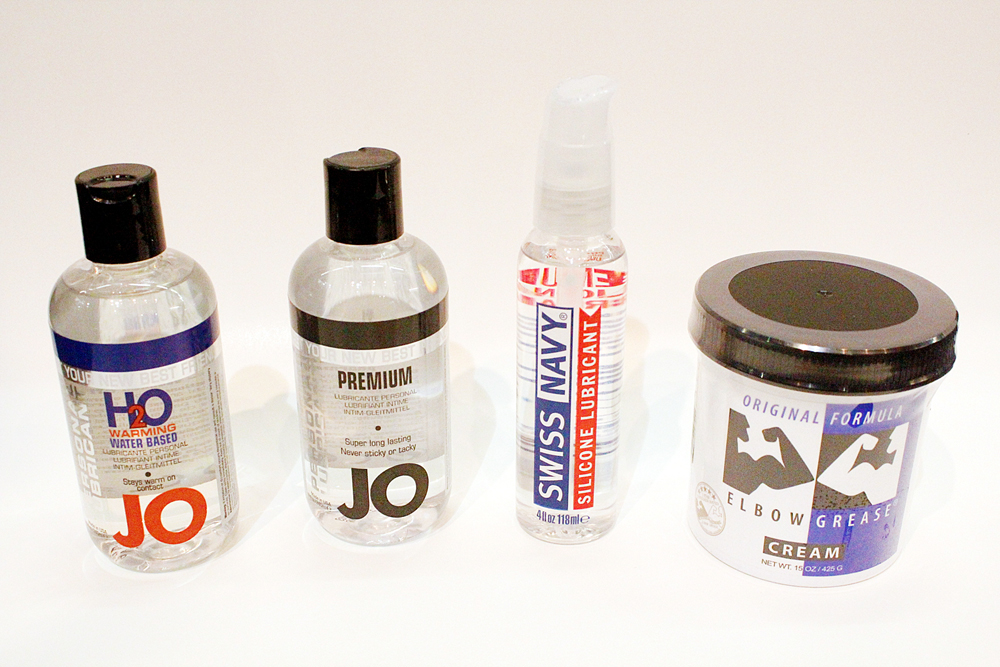What are we discussing today? Lubricants! These wonderful liquids can make your sex life much more fun, exciting, easy and pleasurable. There are many reasons to use lubes: anal sex, toys, condoms that just are too dry and somebody just not being wet enough for whatever reason.
This little primer is designed for people who have never used lube before or are general lube novices. Much of the information was provided by a good friend who worked at an adult shop and has acquired the moniker “Dirty Mike” among our circle of friends.
First, there are four basic types of lube, all dependent on what the base for the lube is: water, silicone, water/silicone and oil. Each of these have their own vices and virtues.
Water-based lubricant is the most common type and comes in different variants such as warming, cooling, flavored, tingling or plain. It’s also the cheapest lube, both in price and quality, though quality and price differ by company. It’s easy to clean up, being that the main ingredient is water. You can also use it on your sex toys and condoms. However, you can’t use it if you are having sex in the shower, as it just washes away. One other possible downside of this type of lube is that it often contains additives to stimulate the skin and help it exude moisture. These additives may cause a minor rash on some people.
Regarding brands of water-based lubes, Dirty Mike said, “The lube/toy company Wet makes many excellent water-based lubes. They also have the advantage of being not overly expensive. A better and more expensive water-based lube is made by the company Jo. But for first-timers, Wet is a good buy. Until recently, KY was the most common, as it was the only one really on the market. And, until recently, it comparatively sucked. They’ve come up in quality, however. Depends on what you’re going for. KY has a nice line of warming lubes.”
Next, there are silicone-based lubes, which is the type of lube you find on most lubricated condoms. Silicone is an inert chemical, meaning it doesn’t react with human tissue. It is therefore safe and naturally hypoallergenic, which is something that may interest those of you that have sensitive skin. Because it works so well, and because silicone is a little harder to get than water, these lubes are a little more expensive.
Also, silicone lubes are not recommended for ingestion, so flavored varieties are out. They won’t hurt you, but they will give you diarrhea. Be careful using them in the shower. They don’t wash away, but they can also make the floor of your shower slick. And you absolutely CANNOT use silicone lubes on silicone toys. Just about the only thing that silicone bonds with is other silicone, so if you use it with your silicone toys it will result in a gluey, warped mess, ruining the toy and your sexy mood.
According to Dirty Mike, Wet makes a pretty good silicone lube, as does Jo. The brand Sex in the Shower makes a pretty popular silicone lube as well.
The third type of lube is the water/silicone hybrid. As the name suggests, these are lubes that try and make the best of both worlds. Primarily consisting of water, these add 5–15 percent silicone to the mix to help the lube stay slick by slowing the absorption of the water from the lube. They aren’t as hard to clean up as silicone lubes, and most have the added benefit of being silicone-toy safe as they don’t have enough silicone to do any damage to the toy.
Lastly, there are oil-based lubes. Oil has been used as a sexual lubricant by people for millennia. Vegetable oil, Crisco, lard, butter—you name it, we’ve probably used it for sex. Some historians even think that a major reason olive oil was so popular in ancient Greece was its use as a sex lube. Nowadays, there aren’t many oil-based lubes out there because of a very important chemical fact: Oil eats plastic. Rubber is a form of plastic. Latex is a form of rubber. In short, oil eats condoms. It can also upset the pH balance of a person’s genitals, and when that happens we have fungus among us. But, since it’s slow to absorb into the skin, it stays slick for a good long while.
Dirty Mike said, “If you absolutely HAVE to use oil AND a condom, make sure your condoms aren’t rubber. You can find condoms made from lambskin, neourethane and polyurethane that won’t react to the oil, and thus won’t break. Be advised, however, that condoms made from materials other than latex are not as effective at preventing STIs.”
Something else to keep in mind: The little $1–2 trial packages of lube carried by sex shops are your best friend. When you’ve never tried a certain lube before, get it in the trial size. It’s an unfortunate fact of life that sometimes you or your partner can have reactions to lubes that can’t be anticipated. Somebody once complained to me that they would never buy a full-sized bottle on the first try again after one experience that left them with an unpleasant burning sensation and a wallet $12 lighter.
On a similar note, discussing lubricants with employees at sex shops is often a good idea. They are knowledgeable and talking about stuff like this is their job. It has been my observation that they have often tried a few of the brands, so they can offer suggestions based on personal experience. If you or your partner are sensitive and prone to allergic reactions or general irritation, the employees can help steer you toward brands that are less likely to cause problems.






